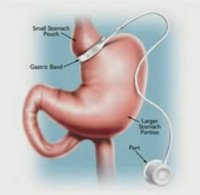Gastric band weight-loss surgery can boost reflux

From U.S. News & World Report
Obese patients with GERD may choose gastric bypass instead, experts say
Gastric banding, a surgical procedure designed to combat obesity, appears to boost the risk for developing or exacerbating symptoms of gastro-esophageal reflux disease (GERD).
The finding stems from a review of research on the link between obesity and reflux. The experts concluded that gastric bypass may help reduce GERD, but gastric banding does not -- a finding patients may want to consider when choosing one form of weight-loss surgery over another.
"For people with obesity and reflux together, the gastric bypass procedure appears to be effective not only for weight loss, but also for the control of reflux symptoms," concluded the review's lead author, Dr. Frank K. Friedenberg, an associate professor in the section of gastroenterology at Temple University School of Medicine, Philadelphia. "Because in this case, most of the acid from the stomach is being partitioned away, so it doesn't have exposure to the esophagus," he explained.
"However, with gastric banding, the problem is that you actually create a pocket which acid has the ability to fill from the remainder portion of the stomach," Friedenberg said. "And this acid can just sit there above the band, and make its way back up to the esophagus. This can cause reflux disease to develop, or make it worse than it had been if it was a problem before the procedure."
Friedenberg and his colleagues published their findings in the August issue of The American Journal of Gastroenterology.
Gastroesophageal reflux disease (GERD) occurs when a muscle at the end of the esophagus does not close properly, allowing irritating stomach contents to leak back into the esophagus. Symptoms include heartburn and acid indigestion.
According to the new analysis, involving numerous studies, a high body mass index (BMI) and/or high amounts of abdominal fat does appear to raise the odds for significant acid reflux.
The researchers also found that diet-induced weight loss can help minimize GERD symptoms.
However, not all weight-loss surgeries were equally beneficial with respect to GERD, Freidenberg's team found.
Across several studies, a procedure known as Roux-en-Y gastric bypass -- which involves the creation of a small gastric pouch walled off from (or bypassing) the rest of the stomach and intestinal track -- consistently appeared to help patients shed pounds and eliminate or reduce GERD symptoms.
However, laparoscopic (gastric) banding was found to be less helpful in tackling GERD.
The popular surgery, which involves the placement of a band to divide and reduce the size of the stomach, initially debuted in 1993. It has proven effective in helping patients feel satiated earlier, spurring weight loss.
Patients often did lose weight after banding, the researchers found, and this reduction in weight did not immediately encourage GERD. In fact, in some cases, post-procedure weight loss appeared to moderately reduce some reflux disease symptoms, the researchers said.
However, the inserted gastric band often seems to shift in place over time, they said, leading to a reversal of any initial benefit and a gradual worsening of GERD symptoms.
Based on these findings, Friedenberg and his team concluded that gastric bypass may be "the preferred surgical technique" with specific regard to GERD risk. But they also pointed out that more rigorous studies need to be conducted to better understand the how's and why's of reflux disease in the context of weight-loss surgery.
One expert said the current work highlights the need to carefully assess the pros and cons of each weight-loss procedure.
"Gastric bypass is the most common and the most successful of the surgical procedures to deal with obesity," noted Dr. Anthony A. Starpoli, an attending gastroenterologist at Lenox Hill Hospital and director of gastro-esophageal research and endo-surgery at St. Vincent's Hospital, both in New York City. "But the advantage to the banding procedure is that, although it will not be an effective option for all patients -- depending on the level of obesity -- it's a lot less aggressive than bypass and has a lot less morbidity associated with it. And it's much more reversible. So, there are reasons some patients might choose that option."
Read more Gastric band weight-loss surgery can boost reflux
Labels: bariatric surgery, gastric band

0 Comments:
Post a Comment
<< Home